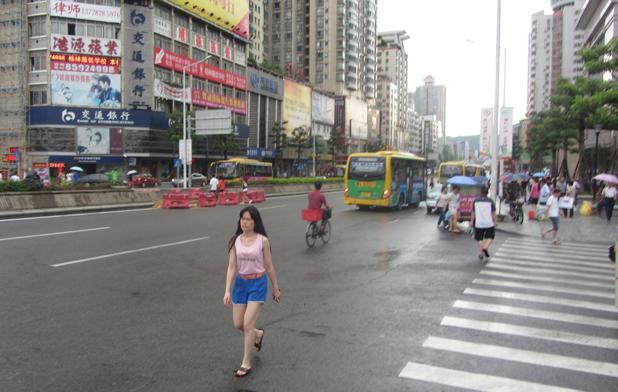Guangdong Chief Yang Contender for a Top Slot in China Leadership Transition
Guangdong relies more on private business than other parts of China. (Photo: Mary Kay Magistad)
China is edging up on a once-in-a-decade leadership transition, which could come in a couple of weeks, or not for months. The Party leadership isn’t saying, nor is it saying who’s stepping in to the country’s top 7 to 9 slots, on the Politboro Standing Committee.
One of the leading contenders is the current Communist Party Chief of Guangdong, Wang Yang, who’s cultivated an image as a political reformer.
It’s not easy building a reputation as a political reformer in China, though Wang Yang has certainly tried. He took a novel approach to quelling unrest in the village of Wukan last year — listening and negotiating, rather than cracking heads. He’s also allowed some non-government organizations to become legal – as few are in China.
One is the Guangzhou Social Service Center for the Disabled. Its co-founder, Hong Tu, says she is seeing some policy changes.
“I can see that they try to do something to try to cooperate with civil society and with NGOs, but I think they need to try to do more.”
She says the government should try to understand how NGOs work and cooperate with them, rather than try to control them.
“I think the government should understand, if people try to do something for a better life, it’s not against government, but it’s to do something to improve the society.”
Party leaders have their doubts, so even in Guangdong, they’ve kept a short leash on NGOs dealing with labor rights.
In a little neighborhood on the outskirts of Shenzhen, Zhang Zhiru, the head of the labor rights group, Spring Breeze, ticks off some of the problems his group has had.
Zhang says they’ve been kicked out of multiple places they were renting, because the police leaned on the landlords. They couldn’t register as a non-government organization, only as a company. That leaves them vulnerable to being accused of inappropriate activities when they advocate for workers.
So Zhang isn’t so sure that Guangdong Party Chief Wang Yang is a political reformer.
“Labor rights groups had more room to operate under the last guy,” he said. “When Wang Yang came in, he made it harder for us.”
Some journalists in Guangdong are of two minds, too. Guangdong’s news media have long been known for being feistier than those in most other places in China. There was a brief time when Wang Yang said they could criticize the Guangdong government. That lasted about a month, before the Central Government weighed in and put a stop to that. Guangdong editors have been fired for overstepping the line.
Yang Chen, who has worked as a reporter and editor for the newspaper Southern Metropolis, says every year they have a new reason to tighten up on the media, and it keeps getting tighter.
“When it comes down to it, they just want to save face, and make sure everything looks good,” he said.
That’s especially true in the lead-up to the Party Congress. Other Guangdong journalists say they’ve been ordered not to write anything that could hinder Wang Yang’s prospects — like stories on social unrest, piracy, and other social ills. But they are encouraged to report on Wang Yang’s ‘strike hard against crime’ campaign — cracking down on smuggling and corruption.
A self-made businessman I met on an evening’s stroll out in Shenzhen was skeptical. Mr. Ye, who’s 38, supplies leather to shoe factories.
“Let me tell you, they say this is a strike against crime? Aiya, in China, the police and gangsters are the same.”
Just down the street, a smuggler named He says he hopes the local government does crack down on the gangsters who demand a cut to let him bring powdered milk and other goods up from Hong Kong.
“People really distrust each other,” he said. “It adds stress, and adds cost to living in this society. If everyone could trust each other, we would all live a more relaxing life. Otherwise, it’s just tiring.”
Guangdong Party Chief Wang Yang has talked of wanting to improve the happiness quotient for Guangdong residents, about the importance of them ‘freeing their minds.’
It’s hard to know how much of this was talk, and how much was a genuine effort to make Guangdong a model to show what political reforms could do.
Liu Kaiming is the founder and executive director of the Institute for the Social Agenda, a labor rights and civil society advocacy group that the local government tolerates, but refuses to make legal. He doesn’t believe a government-led “Guangdong Model” of political reform really exists. He says Guangdong, with its international ports and proximity to Hong Kong, has long been more open, and more driven by private initiative, than the rest of China. Wang Yang deserves some credit, he says, but Guangdong’s people deserve more.
“From Shenzhen, from Guangdong, you can see the future China. And according to my experience, the people have changed.”
And when society changes, the government has to change with it, he says. Bu he’s not holding his breath for that to happen soon.
Journalist Yu Chen agrees. “All kinds of rights come from sacrifice and struggle, generation after generation. People and technology will change this society. In 5 or 10 years, maybe we’ll see the end of the great fire wall. I once had a bet with a friend, that I would outlive the Communist Party. I can see that day coming.”
